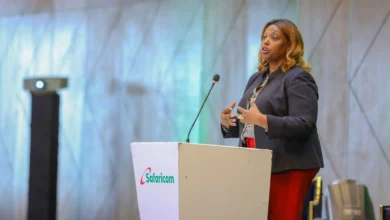Kenya’s Melissa Kariuki Joins Recording Academy: A Historic Moment for African Music Technology
Melissa Kariuki, founder of Whip Music, has been invited to join the Recording Academy’s prestigious 2025 New Member Class, marking a groundbreaking moment for Kenya’s music technology sector and African representation in the global music industry.
Recording Academy Invitation Signals Global Recognition
The Recording Academy, the world’s most influential society of music professionals and the organization behind the GRAMMYs, has invited Kariuki to join its 2025 New Member Class of nearly 3,600 music professionals worldwide. This invitation represents a significant milestone for African music technology, as Kariuki becomes one of the continent’s first music-tech entrepreneurs to join the prestigious organization.

The Academy’s 2025 class demonstrates a strong commitment to diversity, with 49% women, 56% people of color, and 60% under the age of 40. Kariuki proudly represents all three demographics, positioning her as a powerful voice for underrepresented communities in the global music industry.
From University Open Mics to Global Recognition
Kariuki’s journey began during her university years when she hosted open mics and art festivals. “I started by hosting open mics and art festivals as a university student. I never imagined it would lead me here — running a music company and now being invited to the Recording Academy,” she shared.
Her educational background includes a First-Class Honours degree from the African Leadership University in Mauritius and a Master of Management Science in Global Affairs as a Patrice Motsepe Fellow and Schwarzman Scholar at Tsinghua University in Beijing, where she achieved a 99% distinction for her thesis on Blockchain, NFTs, and Web3 adoption and regulation.
Whip Music: Revolutionizing African Music Marketing
Through Whip Music, Kariuki is transforming how African artists reach global audiences by leveraging data, automation, and artificial intelligence to market music more effectively. The company has already executed over 200 campaigns across Kenya, Nigeria, South Africa, the United States, and beyond, promoting notable artists including David Guetta, CKay, Ayra Starr, Fave, and The Cavemen.
Whip Music’s mission centers on providing every African artist, particularly new and independent talent, with affordable, technology-powered solutions to amplify their voices in the global music market. The platform offers comprehensive services including music and video distribution, editorial playlisting, television placements, radio promotion, press coverage, influencer marketing, and social media advertising.
Google for Startups Africa Accelerator Achievement
In 2023, Whip Music achieved a historic milestone by becoming the first music-tech startup from Africa accepted into the Google for Startups Africa Accelerator program. This achievement aligns with Google’s broader commitment to supporting African startups, as evidenced by their selection of numerous African companies for various accelerator programs.
The Google for Startups Africa Accelerator has consistently supported innovative African companies across multiple sectors. Previous cohorts have included Kenyan startups like Silqu, Snark Health, K-12 EdTech, and Taimba, demonstrating the program’s commitment to fostering technological innovation across the continent.
Strategic Partnership with Boomplay
Whip Music has established a strategic partnership with Boomplay, Africa’s largest streaming platform with over 100 million users. This collaboration positions Whip Music within the broader African music streaming ecosystem, which has experienced significant growth in recent years.
Boomplay’s influence in the African music industry cannot be overstated. The platform currently boasts over 90 million monthly active users and a vast catalog of more than 100 million songs from around the world. Through partnerships like the one with TikTok and collaborations with telecommunications companies like Safaricom, Boomplay has become a central player in Africa’s music distribution landscape.
Kenya’s Growing Music Technology Ecosystem
Kariuki’s achievement comes at a time when Kenya’s music technology sector is experiencing unprecedented growth. The country has emerged as a hub for music innovation, with projects like Studio Can-V transforming shipping containers into high-tech music studios and various partnerships between technology companies and music platforms expanding access to music streaming services.
Spotify data reveals that Kenyan music has experienced remarkable global growth, with artists being discovered by first-time listeners more than 95 million times in 2024 alone. Local consumption of Kenyan music has surged 277% between 2019 and 2022, while international streams for female Kenyan artists grew by 98% in 2024.
Impact on African Music Industry Representation
Kariuki’s appointment to the Recording Academy represents more than personal achievement; it signifies a broader shift toward African representation in global music industry governance. As a member of the Academy, she will help shape the GRAMMY process and champion the interests of music professionals worldwide, with particular focus on voices from Kenya and Africa at large.
The significance of this representation extends beyond individual recognition. Africa’s music industry has experienced substantial growth, with the African music streaming market projected to reach significant valuations and platforms like Spotify featuring hundreds of African artists on editorial playlists.
Technology-Driven Music Marketing Innovation
Whip Music’s approach to music marketing reflects broader trends in the intersection of technology and creative industries. The company’s use of data, automation, and AI to market music represents a sophisticated understanding of modern music distribution and audience engagement strategies.
This technology-forward approach aligns with broader developments in Kenya’s creative economy, which has been expanding 60% faster than conventional industries. The government has committed to doubling the creative economy’s GDP contribution from 5% to 10% by the end of 2025, creating an environment conducive to innovation in music technology.
Global Context and Industry Significance
The Recording Academy’s invitation to Kariuki reflects the organization’s commitment to diversifying its membership and incorporating global perspectives into music industry governance. The Academy’s focus on diversity, with significant representation from women, people of color, and younger professionals, aligns with broader industry trends toward inclusivity and international representation.
This development occurs within a context of increasing global recognition of African music and creative industries. Platforms like Spotify have launched initiatives such as “Spotify Talks Africa” to bring together continental music industry stakeholders and discuss solutions for driving success among African creatives.
Future Implications for African Music Technology
Kariuki’s membership in the Recording Academy positions her to influence global music industry standards and practices, potentially benefiting African artists and music-tech companies. Her role provides a platform to advocate for policies and practices that support emerging markets and independent artists, particularly those from Africa.
The appointment also signals growing recognition of Africa’s music technology sector as a legitimate and innovative force in the global music industry. As African music continues to gain international recognition and streaming platforms expand their presence on the continent, representatives like Kariuki become increasingly important for ensuring African interests are represented in industry governance.
Educational and Professional Background
Kariuki’s professional journey includes experience at major technology companies including Google and Meta, as well as consulting experience at organizations like Bain & Company, H&M, the Gates Foundation, and INSEAD. This diverse background provides her with the technical and business acumen necessary to navigate the complex intersection of technology and music.
Her academic achievements, including her distinguished thesis on Blockchain, NFTs, and Web3 adoption and regulation, position her to address emerging technologies’ impact on the music industry. This expertise becomes particularly relevant as the music industry continues to evolve with new technologies and distribution models.
Conclusion
Melissa Kariuki’s invitation to join the Recording Academy represents a historic moment for African music technology and Kenya’s creative economy. Through Whip Music, she has demonstrated the potential for African entrepreneurs to create innovative solutions that serve both local and global markets. Her appointment provides a platform for advocating for African interests in global music industry governance while continuing to support the growth of the continent’s music ecosystem.
As Kariuki stated, “This is a milestone for me and for Whip. It shows that Kenyan entrepreneurs, creatives, and innovators belong at the top tables in music. It’s a chance to represent not just our artists, but the next generation of African founders who want to build something different”. Her achievement signals that the world is indeed listening to Africa’s music and technology innovations.






